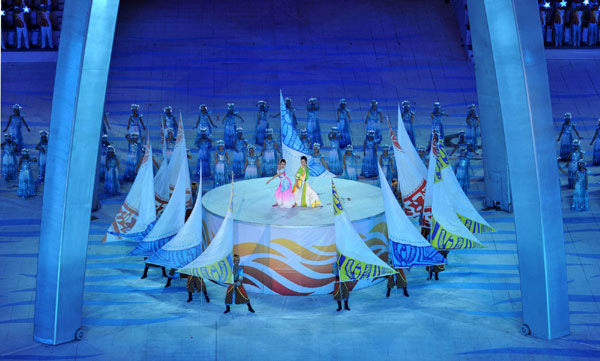
Performers take part in the closing ceremony of the 16th Asian Games in Guangzhou, South China's Guangdong Province, Nov 27, 2010. (Xinhua Photo)
BEIJING, Nov. 28 (Xinhuanet) -- It's a roaring success, say the critics, and Guangzhou has every reason to be proud of having hosted one of the best Asian Games ever. The 16th Asian Games has also seen fewer drug abuse cases than in the past, despite athletes setting higher standards and more countries and regions sharing medals, officials said on Saturday.
Only two positive results were returned from 1,400 random doping tests, down from the 16 cases recorded at the Doha Asian Games in 2006.
The Games were well-managed and can be seen as a complete success, they said. The city has also rushed and completed new infrastructure projects in time for the Games.
"Although there were some incidents, like the problems between the two Koreas, and an athlete that used unfair technical equipment in the competition, I can now officially announce that the Guangzhou Asian Games is a success, and one of the best among all the Asian Games," said Olympic Council of Asia (OCA) President Sheikh Ahmad Al-Fahad Al-Sabah.
"My objective criteria is satisfaction all round," said Wei Jizhong, deputy honorary life president of the OCA. "The central, provincial and municipal government, all participants and most of our media friends, are all satisfied. The Guangzhou Asian Games is perfect."
Both senior officials were speaking at a press conference with other members of the OCA and the Guangzhou Asian Games Organizing Committee (GAGOC) to provide a review of the past 16 days.
"Some OCA officials even said that the opening ceremony of the Guangzhou Asian Games was better than that of the Beijing Olympics. The (Athletes') Village and facilities were better than Beijing," said Sheikh Ahmad.
A total of 9,704 athletes from 45 countries and regions, 4,983 team officials, 4,191 technical officials and 9,939 journalists congregated for the largest-ever Asian Games in history.
In all, 28 countries and regions pocketed gold, and 36 took home at least one medal.
As of Friday, three world records were broken, and 12 Asian records were set in swimming and cycling.
Chinese weightlifter Li Ping broke the snatch and total world records in the women's 53kg class on Nov 14, while Korean teenager Kim Woo-jin set a new world record during the qualifying rounds for the men's individual archery event.
The games also gave regional sports a platform on which to shine, thanks to the inclusion of 14 non-Olympic sports.
Meanwhile, all 53 competition venues satisfied the requirements of the OCA, and a vast information security network guarded against thousands of Internet viruses and attacks, said Xu Ruisheng, vice mayor of Guangzhou and deputy executive secretary-general of GAGOC.
Guangzhou will definitely benefit from all these, said Sheikh Ahmad.
"I was here seven years ago. This time, I am seeing new infrastructure and new facilities which helped Guangzhou achieve its goal," he said. "There is also a change in the environment. More green. Guangzhou is now a hub known to more people. The Games added value for Guangzhou and for the development of sport."
The city has built the venues with the aim of better serving its citizens after the Games end, said Xu, adding that authorities spent 6.3 billion yuan ($945 million) on the construction of the venues.
"We now have 53 competition and 17 training venues that can improve sports facilities in Guangzhou," he said.